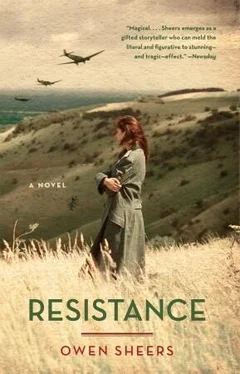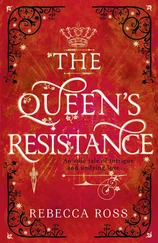For the next two days, whenever he could, Gernot watched the slope behind The Court from his bedroom window. He was convinced those brief moments on the turn of each furrow had been enough. On the evening of the second day his belief was rewarded when he saw Bethan appear through the new bracken and crouch behind the trunk of the thorn tree. Leaving himself no time to question, he walked out of the room, down the narrow stone stairs, and out of the farmhouse, his head light above his body and the skin across his temples throbbing with his pulse.
The lowering sun had not quite set behind the Hatterall ridge, the last sliver of its disc flaring from over the silhouetted horizon. Gernot walked into a kaleidoscope of transparent orange and yellow spheres and hexagrams, long streams of light playing through the branches of the trees. He knew where the thorn tree stood, however, and he made his way steadily up the hill in its direction, painfully aware that the light blinding him would illuminate his face for Bethan as he walked towards her.
When he reached the thorn tree, she was still there. He’d somehow thought she would not be, that like a deer spotted in the woods, or a fox paused in a garden, he would arrive to find nothing more than the imprint of her feet and a branch still quivering from where she’d passed.
She did not seem afraid when she looked up at him. As she did, Gernot clearly saw the last ebbing of the girl still within her, and it made him aware of the shadow of the boy still in him, the boy who had been submerged so rapidly with his entry into the army.
“Hello,” he said, the English word thick on his tongue. “I am Gernot.”
She smiled. “I know.”
Gernot sat down beside her. So far this was all as he had forecast, as he had planned a hundred times before in his mind. But now he seemed unable to follow the script he’d written for himself. He tried to picture it, reaching out an arm about her shoulder, drawing her close, then both of them slowly tipping back against the bracken behind them. But it was no good, so instead he just sat beside her and looked out over the valley as she did.
Opposite them, on the other side of the valley, the setting sun had cast a broad band of amber along the ridge and upper slopes of the Black Hill. The sky behind the hill was lit an impossible blue. Together they watched this strip of evening light tighten, a seam of burnished earth compressed between the land and sky, deepening in colour as it narrowed until just the hill’s long spine shone bronze and everything below it was night.
“It is beautiful,” Gernot said, struggling with the last word.
She turned to look at him. This time she did not smile.
“You are beautiful,” he said, still looking out at the darkening valley.
She kept looking at him, so when he turned to her she was there, her face near his. And that was when he’d leant in and kissed her. That was when he’d felt her breath on his mouth, when he’d brushed her lips with his.
But then she was pulling away from him, frowning, shaking her dropped head. “No,” she said, the word no more than a breath on her lips.
And then she left. Suddenly, she stood up and left. Gernot turned in time to see the herringbone pattern of her coat disappearing into the bracken out of which she’d emerged just minutes before. He heard her brushing through the stiff stems and leaves. And then she was gone. It was as if in kissing her he had banished her. As if she had been just a reflection and the lightest touch of their mouths had shattered the mirror between them.
Sitting there, alone on the hillside, Gernot thought he’d see Bethan again the next day. That they would look out over the valley once more tomorrow. But she hadn’t come back, and now he’d learnt that her mother had sent her away. For how long he didn’t know. Why had she done this? Was it really because he’d kissed her? How could her mother have known? What trace of him had Bethan carried with her back to that dark farmhouse on the other side of the valley?
Whatever it was he wished he could retrieve it, take that kiss back, if it meant she would return to him. Now, with her gone, he’d rather live with the promise of those moving lips than with the knowledge of their brief taste. But he would wait, that is what he would do. He had waited before, through the longest of winters, just to see her, and he could wait again. He’d entered this war expecting to die, expecting each day to be his last. But he’d been wrong. The war had led him not to death, but to her, and to life. So he would wait for her and then, when she returned, when she came back to him from over the hills, his waiting would be done and they would leave. Leave this valley, the patrol, the other women, and walk out into a new world together, as young and unknown as their love.
Maggie’s radio says as it’s over, Tom. Here at least. Butler is working with the Germans. It’s over. So why don’t you come back? I know you’re still there. I feel it. But it’s been so long, Tom. I’m twenty-seven. I’ll never be twenty-seven again. It’s not just you that’s been gone these months, Tom. It’s me too .
I wish we’d said more when you were here .
We’ll have to dip soon, and shear. And then there’s the hay. I see the meadows growing and I remember last year. You working with Reg and the boys. How hot it was. Will it ever be like that again, Tom?
I don’t think Mary should have sent Bethan away. It’s going bad with her being so alone. But then it’s bad for all of us .
The radio says it’s over, but there’s still trouble with insurgents. That’s what they call them, Tom. They say as no one wants them anymore. That it’s time to move on .
The elder’s flowered, and the laburnum. I found a nest dropped out of the hedge yesterday. There were three eggs still in it. Two sparrow and one cuckoo .
Albrecht and Sarah were walking back from the Red Darren, picking their way through the dark landslides of broken scree and sandstone. Sarah had wanted to see the map again. Although surprised by her request, Albrecht had been pleased too, so he agreed to meet her early in the morning at the mouth of the crevice. Inside he shone his torch over the dappled canvas for her once more, illuminating and translating the handwritten texts and illustrations. He showed her the mapmaker’s impression of the Magi’s journey, an almost comical series of sepia loops and diversions across Asia and the Middle East. In return Sarah had mentioned the poet again. She said the traced wanderings of the Magi reminded her of an afternoon she’d spent with him as he recounted the story of Percival and his own wandering journey in search of the grail.
Now, back in the morning light, silence had settled upon them once more as they walked down the slope, dislodging fragments of rock from under the larger slabs they used as stepping-stones. Albrecht stopped to prise out one of these fragments from the broken sole of his boot. “There is a book I have been reading,” he said, his voice sudden and unfamiliar on the air. “About another poet who lived here.”
Sarah stopped and turned to look back at him.
“Well, not here in this valley,” he continued. “But over there. Where you lived as a girl. Landor. This is his name.”
“Squire Landor?” Sarah said, raising a hand to shield her eyes from the low sun. “My father used t’tell me stories about him. My grandfather rented a farm off his estate. Wanted t’plant the whole valley with cedars, he did. An’ he tried bringing in a Spanish flock.” She half smiled and shook her head. “From what my father said, the valley gave him a hard time of it.”
Albrecht smiled back at her, nodding. “Yes, it seems they did.”
Читать дальше












